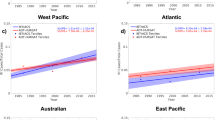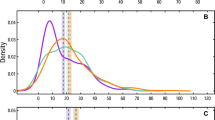Abstract
Arising from: K. Emanuel Nature 436, 686–688 (2005); K. Emanuel reply.
Anthropogenic climate change has the potential for slightly increasing the intensity of tropical cyclones through warming of sea surface temperatures1. Emanuel2 has shown a striking and surprising association between sea surface temperatures and destructiveness by tropical cyclones in the Atlantic and western North Pacific basins. However, I question his analysis on the following grounds: it does not properly represent the observations described; the use of his Atlantic bias-removal scheme may not be warranted; and further investigation of a substantially longer time series for tropical cyclones affecting the continental United States does not show a tendency for increasing destructiveness. These factors indicate that instead of “unprecedented” tropical cyclone activity having occurred in recent years, hurricane intensity was equal or even greater during the last active period in the mid-twentieth century.
This is a preview of subscription content, access via your institution
Access options
Subscribe to this journal
Receive 51 print issues and online access
$199.00 per year
only $3.90 per issue
Buy this article
- Purchase on Springer Link
- Instant access to full article PDF
Prices may be subject to local taxes which are calculated during checkout


Similar content being viewed by others
References
Knutson, T. R. & Tuleya, R. E. J. Clim. 17, 3477–3495 (2004).
Emanuel, K. Nature 436, 686–688 (2005).
Landsea, C. W. Mon. Weath. Rev. 121, 1703–1714 (1993).
Franklin, J. L., Black, M. L. & Valde, K. Weath. Forecast. 18, 32–44 (2003).
Dunion, J. P., Landsea, C. W., Houston, S. H. & Powell, M. D. Mon. Weath. Rev. 131, 1992–2011 (2003).
Kepert, J. & Wang, Y. J. Atmos. Sci. 58, 2485–2501 (2001).
Kepert, J. J. Atmos. Sci. 58, 2469–2484 (2001).
Landsea, C. W. et al. Bull. Am. Meteorol. Soc. 85, 1699–1712 (2004).
Landsea, C. W., Pielke, R. A. Jr, Mestas-Nuñez, A. M. & Knaff, J. A. Clim. Change 42, 89–129 (1999).
Goldenberg, S. B., Landsea, C. W., Mestas-Nuñez, A. M. & Gray, W. M. Science 293, 474–479 (2001).
Landsea, C. W. et al. Hurricanes and Typhoons: Past, Present and Future (eds Murname, R. J. & Liu, K.-B.) 177–221 (Columbia Univ. Press, New York, 2004).
Blake, E. S., Rappaport, E. N., Jarrell, J. D. & Landsea, C. W. The Deadliest, Costliest, and Most Intense United States Tropical Cyclones from 1851 to 2004 (and Other Frequently Requested Hurricane Facts) (National and Oceanic Atmospheric Administration, Technical Memorandum NWS TPC-4, 2005).
Author information
Authors and Affiliations
Rights and permissions
About this article
Cite this article
Landsea, C. Hurricanes and global warming. Nature 438, E11–E12 (2005). https://doi.org/10.1038/nature04477
Published:
Issue Date:
DOI: https://doi.org/10.1038/nature04477
This article is cited by
-
Global intensification of weak tropical cyclones in the past 30 years
Science China Earth Sciences (2024)
-
Ocean currents show global intensification of weak tropical cyclones
Nature (2022)
-
Roles of interdecadal variability of the western North Pacific monsoon trough in shifting tropical cyclone formation
Climate Dynamics (2022)
-
Atlantic tropical cyclones downscaled from climate reanalyses show increasing activity over past 150 years
Nature Communications (2021)
-
Directed technical change and environmental quality
Portuguese Economic Journal (2021)
Comments
By submitting a comment you agree to abide by our Terms and Community Guidelines. If you find something abusive or that does not comply with our terms or guidelines please flag it as inappropriate.



